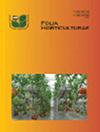Evaluation of postharvest storability of Ponkan mandarins stored at different temperatures
IF 1.8
4区 农林科学
Q2 HORTICULTURE
引用次数: 1
Abstract
Abstract The effects of storage temperature on postharvest storability, quality attributes and antioxidant enzyme activities of harvested Ponkan mandarins were investigated. Fresh fruits were randomly divided into four groups and stored at different temperatures [5 ± 1 °C (S5), 10 ± 1 °C (S10), 15 ± 1 °C (S15), and 20 ± 1 °C (S20 or control)] for 120 days. The results indicated that, compared with the control fruit, low-temperature storage at 10 °C significantly delayed the increase in fruit decay rate, weight loss, citrus colour index, respiration intensity, relative electrical conductivity, the accumulation of hydrogen peroxide and malondialdehyde, retarded the decline in L* value, retained high contents of total soluble solid, titratable acid, vitamin C, total phenol and total flavonoid, as well as higher activities of antioxidant enzymes – superoxide dismutase, catalase, peroxidase and ascorbic peroxidase. The principal component analysis results showed that low-temperature storage significantly maintained the postharvest quality of Ponkan mandarins, with fruit stored at 10 °C having no significant difference from the fruit stored at 5 °C, but markedly higher than those fruit stored at 15 °C. The comprehensive result of single-factor analysis and PCA showed that 10 °C could be used as the optimum storage temperature for improving the postharvest storability of Ponkan mandarins.不同温度贮藏的蓬坎柑橘采后贮藏性评价
摘要研究了贮藏温度对采后贮藏性、品质性状和抗氧化酶活性的影响。新鲜水果被随机分为四组,并在不同温度[5±1°C(S5),10±1°C.(S10),15±1°C.S15和20±1°CS20或对照)]下储存120天。结果表明,与对照果实相比,10°C低温贮藏显著延缓了果实腐烂率、失重、柑桔色指数、呼吸强度、相对电导率、过氧化氢和丙二醛积累的增加,延缓了L*值的下降,保留了高含量的可溶性固形物、可滴定酸,维生素C、总酚和总黄酮,以及较高的抗氧化酶活性——超氧化物歧化酶、过氧化氢酶、过氧化物酶和抗坏血酸过氧化物酶。主成分分析结果表明,低温贮藏显著保持了蒲柑采后品质,10°C贮藏的果实与5°C贮藏没有显著差异,但明显高于15°C贮藏。单因素分析和主成分分析的综合结果表明,10°C可作为提高麻橘采后贮藏性的最佳贮藏温度。
本文章由计算机程序翻译,如有差异,请以英文原文为准。
求助全文
约1分钟内获得全文
求助全文
来源期刊

Folia Horticulturae
Agricultural and Biological Sciences-Horticulture
CiteScore
3.40
自引率
0.00%
发文量
13
审稿时长
16 weeks
期刊介绍:
Folia Horticulturae is an international, scientific journal published in English. It covers a broad research spectrum of aspects related to horticultural science that are of interest to a wide scientific community and have an impact on progress in both basic and applied research carried out with the use of horticultural crops and their products. The journal’s aim is to disseminate recent findings and serve as a forum for presenting views as well as for discussing important problems and prospects of modern horticulture, particularly in relation to sustainable production of high yield and quality of horticultural products, including their impact on human health.
 求助内容:
求助内容: 应助结果提醒方式:
应助结果提醒方式:


